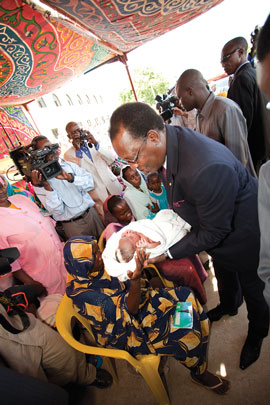Harnessing the Power of Parliamentarians
As one of the newest countries in the SUN Movement, from May 2013, Chad has swiftly taken action to establish a new approach to scaling up nutrition. Through Government Decree 266 passed in July 2013, the Ministry of Public Health appointed a new team to take charge of the National Centre for Nutrition and Food Technology (CNNTA), which is the government’s operational body for nutrition.
[vc_row row_type=”row” text_align=”left” css_animation=””][vc_column width=”1/2″]

Chad has recently joined the SUN Movement and is in the early stages of setting up multi-stakeholder platforms for nutrition.
Mahamat Bechir Mahamat, Head of the National Centre for Nutrition and Food Technology outlines progress so far…[/vc_column_text][/vc_column][/vc_row][vc_row row_type=”row” text_align=”left” css_animation=””][vc_column][vc_separator type=”transparent”][/vc_column][/vc_row][vc_row row_type=”row” text_align=”left” css_animation=””][vc_column]
[vc_separator type=”transparent”][vc_column_text custom_options=””]“In Chad we consider that malnutrition is an epidemic disease and we are mobilising ourselves to fight it”
MahamatAhmed Djidda,
Minister of Health
[/vc_column_text][/vc_column][/vc_row][vc_row row_type=”row” text_align=”left” css_animation=””][vc_column][vc_separator type=”transparent”][/vc_column][/vc_row][vc_row row_type=”row” text_align=”left” css_animation=””][vc_column][vc_column_text custom_options=””]As one of the newest countries in the SUN Movement, from May 2013, Chad has swiftly taken action to establish a new approach to scaling up nutrition. Through Government Decree 266 passed in July 2013, the Ministry of Public Health appointed a new team to take charge of the National Centre for Nutrition and Food Technology (CNNTA), which is the government’s operational body for nutrition.
The CNNTA was restructured and the new team were charged with implementing the new approach and preparing an action plan. Five divisions were created:
- nutrition surveillance
- infant and young child nutrition
- micronutrients and prevention of malnutrition
- food hygiene
- monitoring & evaluation.
The new head of CNNTA, who has experience in crosssectoral work, was appointed as the SUN Focal Point.
Currently, Chad is dealing with a humanitarian crisis and major influx of refugees due to regional food insecurity, price hikes and climate changes. As a result there are a large number of non-governmental organisations (NGOs) – around 18 – providing humanitarian nutrition support.
These NGOs published a report on the nutrition situation in Chad in June 2013 requesting donor support
without the permission of the government. This angered the government at a high level. In September 2013, the Ministry of Public Health issued a circular for the attention of partners active in the field of nutrition. The circular urged partners to inform the CNNTA about their nutrition plans and programmes and to periodically share information on their nutrition activities. This effectively resolved the conflict.[/vc_column_text][/vc_column][/vc_row][vc_row row_type=”row” text_align=”left” css_animation=””][vc_column][vc_separator type=”transparent”][/vc_column][/vc_row][vc_row row_type=”row” text_align=”left” css_animation=””][vc_column][vc_column_text custom_options=””]
A new multi-stakeholder platform
A preliminary multi-stakeholder platform for nutrition had been set up in May 2013 by the previous team at CNNTA with the support of REACH 3. The purpose was to assess the nutrition situation and develop a nutrition policy. The process was accelerated with the new team at CNNTA who hired a consultant to develop the National Nutrition and Food Policy and the Inter-sectoral Nutrition and Food Action Plan. The policy was validated during a workshop in November 2013 and is awaiting adoption by the government. The budget for the action plan is not yet complete.
A multi-sectoral and multi-stakeholder platform was established called the Permanent Technical Committee on Nutrition and Food (PTCNF). To formalise the PTCNF, a terms of reference and a government decree has beendrafted and submitted for signature by the Prime Minister.
[/vc_column_text][/vc_column][/vc_row][vc_row row_type=”row” text_align=”left” css_animation=””][vc_column][vc_separator type=”transparent”][/vc_column][/vc_row][vc_row row_type=”row” text_align=”left” css_animation=””][vc_column][vc_column_text custom_options=””]
Functions of the multi-stakeholder platform
The PTCNF receives technical support from United Nations agencies (REACH, UNICEF, FAO, WHO and WFP) and donor
representatives. The specific functions are to:
- contribute to the identification of priority areas, objectives and multi-sectoral strategies to eliminate hunger and malnutrition in Chad
- contribute to a comprehensive analysis of the food and nutrition situation by providing updated information
- contribute to the development of multi-sectoral strategies and action plans, and participate in their validation
- ensure that sectoral action plans are aligned and reflect strategic objectives and priority actions
- coordinate and stimulate the implementation of various action plans (through the Inter-sectoral Nutrition and Food Action Plan)
- support the development and updating of a database on nutrition and food
- inform the government through the ministries of health and agriculture about implementation of nutrition and food strategies, plans and programmes
- coordinate and ensure complementarity between ongoing initiatives related to nutrition, food and agriculture e.g. REACH, Scaling Up Nutrition (SUN) Movement, Sahel Global Alliance for Resilience Initiative (AGIR) and Comprehensive Africa Agriculture Development Programme (CAADP).
Collaboration between sectors has been fostered by joint missions undertaken by the Ministry of Agriculture (Department of Agricultural Production and Statistics) and the Ministry of Public Health (CNNTA) to the annual SUN Global Gatherings and two regional workshops run by AGIR.[/vc_column_text][/vc_column][/vc_row][vc_row row_type=”row” text_align=”left” css_animation=””][vc_column][vc_separator type=”transparent”][/vc_column][/vc_row][vc_row row_type=”row” text_align=”left” css_animation=””][vc_column][vc_column_text custom_options=””]
Involvement of civil society
International NGOs and UN agencies are very active in the PTCNF. This is partly due to the presence of the Nutrition Cluster4 and NGO involvement in the management of the on-going emergency. In contrast, national civil society organisations and associations are less visible. These national organizations include: the Consumers’ Association and the Association of Pastoralists. The pastoralists are a nomadic population with very limited access to basic services and are therefore considered vulnerable.[/vc_column_text][/vc_column][/vc_row][vc_row row_type=”row” text_align=”left” css_animation=””][vc_column][vc_separator type=”transparent”][/vc_column][/vc_row][vc_row row_type=”row” text_align=”left” css_animation=””][vc_column][vc_column_text custom_options=””]
The power of parliamentarians
Four parliamentarians were invited to the workshop in November to validate the National Nutrition and Food Policy for Chad. Two of these were members of the Health Committee, a third was a member of the Rural Development Committee and a fourth was a member of the Finance Committee. These parliamentarians played an important role during the workshop, including leading the work in plenary.

Subsequently, three parliamentarians – including two who were at the validation workshop – were invited to
participate in a Regional Training Workshop on Nutrition for Parliamentarians held in November 2013 in Brazzaville, Congo and organised by UNICEF. The purpose was to enable parliamentarians to acquire a better understanding of malnutrition and its effects on human and economic development of countries. Members of Parliament from West and Central Africa (Angola, Burkina Faso, Cape Verde, Congo-Brazzaville, Cameroon, Mauritania, Mali, Niger, Central African Republic and Chad) took part.
At the end of the three day workshop, the parliamentarians decided to create a Regional Network of Parliamentarians on Nutrition and implement national networks with the view to pooling their efforts to eradicate malnutrition in the region. An interim executive was set up led by a parliamentarian from Niger with a parliamentarian from Chad serving as rapporteur.
The group of three Chadian parliamentarians have defined their own action plan which is as follows:
- organize a day of nutrition information to Parliament
- lobby the Ministry of Public Health Committee for the creation of a specific budget line for nutrition
- undertake advocacy for nutrition in the regions
- establish regional networks to raise awareness about nutrition.
[/vc_column_text][/vc_column][/vc_row][vc_row row_type=”row” text_align=”left” css_animation=””][vc_column][vc_separator type=”transparent”][/vc_column][/vc_row][vc_row row_type=”row” text_align=”left” css_animation=””][vc_column]
Members of the Permanent Technical Committee on Nutrition and Food
- President: Ministry of Public Health
- Vice-President: Ministry of Agriculture and Irrigation
- Rapporteur: Ministry of Planning, Economy and International Cooperation
- Senior Vice Rapporteur: Ministry of Pastoral Development and Animal Production
- Second Vice Rapporteur: Representatives from civil society organizations
Representatives from the following ministries
- Social Action, National Solidarity and Family
- Environment and Water Resources
- Higher Education and Scientific Research
- Secondary and Professional Education
- Urban and Rural Water Supply
- Trade and Industry
- Communication, Government spokesperson
Representatives from:
- CNNTA
- University of N’Djamena
- Centre for Control of Food Quality
- Chadian Institute of Agronomic Research
- National Food Security Agency
- National Office of Rural Development
- Women’s organisations
- National NGOs working in the field of nutrition
- Producer organizations
- Consumer organizations
- International NGOs working in the field of nutrition
Rapid progress
Despite the relative ‘youth’ of the national multi-stakeholder platform in Chad, much has already been achieved. Policies and plans are in place which will be endorsed by the government. The PTCNF has been given legal status and has successfully brought development partners together to work with government on nutrition issues.
The power of parliamentarians has been harnessed to advocate for nutrition. Big challenges remain, especially in terms of involvement of the private sector, but Chad has made a flying start in bringing diverse groups together in concerted action to improve nutrition.[/vc_column_text][/vc_column][/vc_row][vc_row row_type=”row” text_align=”left” css_animation=””][vc_column][vc_separator type=”transparent”][/vc_column][/vc_row][vc_row row_type=”row” text_align=”left” css_animation=””][vc_column]
Key Lessons
- Multi-stakeholder platforms for nutrition is empowered to act when it are formalized and given legal status.
- Parliamentarians can play an active role in lobbying to improve nutrition and contributing to the actions of the multistakeholder platform.
- Conflict with non-governmental partners can be effectively resolved and diverse groups brought together in concerted action when the government gives authority to the multi-stakeholder platform.
- Preparing and validating nutrition policies, strategies and action plans are key achievements of multi-stakeholder platforms.